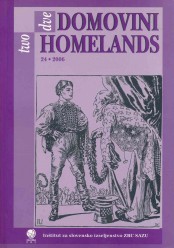»BECAUSE IF YOU CAN’T SPEAK THE SLOVENE LANGUAGE, IT’S AS IF YOU WEREN’T SLOVENE«: (THE ROLE OF THE SLOVENE LANGUAGE IN SHAPING THE ETHNIC IDENTITY OF THE THIRD AND FOURTH GENERATIONS OF SLOVENE POLITICAL EMIGRANTS IN ARGENTINA
Keywords:
Slovene political emigration, identity, language identity, Slovene language, Spanian languageAbstract
This text examines the role of the Slovene language in shaping the ethnic identity of the third and fourth generations of Slovene political emigrants (SPE) in Argentina. They are (were) a specifically homogeneous group, closed for foreign, Argentinean influences, which includes the language as well. The high cultural consciousness and regard for Slovene traditions and folklore helped form numerous cultural associations, where creativity and communication were allowed only in Slovene language – with any violation of these rules resulting in serious moral accusations.
The research dates to April 2006, when it was carried out among the pupils of Saturday Slovene language schools and the students of the Slovene matura course, both in Buenos Aires. Its main target group were the third and fourth generations of SPE, who are, in contrast to their (grand) parents, very much acculturated. They feel a strong emotional attachment to the Slovene language, yet it is limited to the symbolic level, while the communicative function of Slovene is highly neglected and mostly limited to the family. In that environment, as much as 82 % still speak Slovene while the respondents generally speak Spanish (97 %) among themselves. However, it is important to appreciate the incalculable value of its symbolic role as the Slovene language presents the bond of the SPE descendants with the Slovene culture. It could be stated that for them, the Slovene language is the Slovene culture.
The Slovene language remains to this day respected and appreciated among the SPE descendants. Being aware of its value with regard to the future existence of the community, they still learn the language. Admittedly its communicative function is limited, yet for the young, it presents a point of identification i.e. the essence of being Slovene. A number of answers confirmed the role of the Slovene language as the main identification element. Although the questions might have been rather complicated for the young between 12 and 14, the majority of the answers were unambiguous and very importantly, written in very good Slovene.
It can be claimed that the Slovene language is a major ethnic identity element for the representatives of the third and forth generations of SPE. Their straightforward plans to keep preserving the Slovene language (74 % intend to continue learning Slovene), together with the majority (94 %) intending to pass the language to their own children, show the awareness of the young towards the (symbolic) role of the language. For the majority of them, the language remains the bond with the mother country of their parents and in symbolic value, it highly precedes the Spanish language which is only the language of their native country.
Downloads
References
GOMEZEL MIKOLIČ, Vesna, 1999/2000: Povezanost narodne in jezikovne identitete. Jezik in slovstvo 5. 173-185.
GROSJEAN, Francois, 1982: Life with Two Languages: An Introduction to Bilingualism. Cambridge, London, Harvard: Harvard University Press.
JESENOVEC, Mojca, 2004: Lektorat slovenščine na Univerzi v Buenos Airesu. Jezik in slovstvo 3/4. 188-194.
JOSEPH, John E., 2004: Language and Identity. New York: Paigrave MacMillan.
JUŽNIČ, Stane, 1993: Identiteta. Ljubljana: Fakulteta za družbene vede.
JUŽNIČ, Stane, 1983: Lingvistična antropologija. Ljubljna: FSPN.
KALC, Aleksej, 1995: Nekateri vidiki primorskega izseljevanja v Južno Ameriko do 1. svetovne vojne. Kulturno ustvarjanje Slovencev v Južni Ameriki. 33
KRANJC, Janez, 2002: Jezikovni vidiki nacionalne identitete. Slovenska nacionalna identiteta in evropsko združenje — nekateri pravni vidiki. Ljubljana: Inštitut za primerjalno pravo. 23-59.
LUKSIČ HACIN, Marina, 1995: Ko tujina postane dom. Ljubljana: Znanstveno in publicistično središče.
LUKSIČ HACIN, Marina, 1999: Multikulturalizem in migracije. Ljubljana: Založba ZRC SAZU.
MISLEJ, Irene, 1995: Kulturna zgodovina Slovencev v Južni Ameriki. Kulturno ustvarjanje Slovencev v Južni Ameriki. 15—22.
PADILLA, Amado, 1999: Psychology. Handbook o f Language and Ethnic Identity. New York, Oxford: Oxford University Press. 109-122.
SKRBIŠ, Zlatko, 2003: Diasporično slovenstvo: politika, nacionalizem, mobilnost. Družboslovne razprave 42. 9-20.
ŠABEC, Nada, 1995: H a lf pa pu (The Language o f Slovene Americans). Ljubljana: ŠKUC.
ŠABEC, Nada, 2002: Usoda slovenskega jezika med Slovenci po svetu. Zbornik Seminarja slovenskega jezika, literature in kulutre. 7-20.
VASIČ, Smiljka, 1986: Bilingualism o f M igrant Children. Belgrade: Institute for Experimental Phonetics and Speech Pathology,.
ŽIGON, Zvone, 1996a: Funkcionalni bilingvizem in Slovenci v Argentini in Urugvaju. Dve domovini 7. 71—95.
ŽIGON, Zvone, 1996b: Slovenski politični izseljenci v Argentini. Teorija in praksa 2.216-231.
ŽIGON, Zvone, 1998: Otroci dveh domovin. Ljubljana: Založba ZRC SAZU.
ŽIGON, Zvone, 200la: Iz spomina v prihodnost: Slovenska politična emigracija v Argentini. Ljubljana: Založba ZRC SAZU.
ŽIGON, Zvone, 200lb: Slovenska politična emigracija v Argentini. Dve domovini 13. 111-132.
Downloads
Published
How to Cite
Issue
Section
License

This work is licensed under a Creative Commons Attribution-NonCommercial-NoDerivatives 4.0 International License.
Authors guarantee that the work is their own original creation and does not infringe any statutory or common-law copyright or any proprietary right of any third party. In case of claims by third parties, authors commit their self to defend the interests of the publisher, and shall cover any potential costs.
More in: Submission chapter





